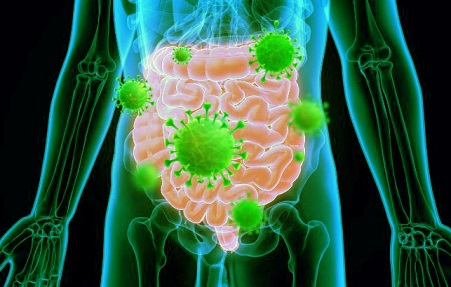Hong Kong study finds that new Omicron variants BA.2.86 and JN.1 shift from airway to intestinal tropism
Nikhil Prasad Fact checked by:Thailand Medical News Team Aug 26, 2024 10 months, 3 weeks, 10 hours, 6 minutes ago
Medical News: Recent research conducted by scientists from Hong Kong has revealed significant findings regarding the behavior of the new SARS-CoV-2 Omicron variants BA.2.86 and JN.1. These variants have shown a notable shift in their tropism, moving from the airway to the intestine. This shift could have profound implications for how these variants are transmitted, potentially increasing the risk of spread through the fecal-oral route. This
Medical News report delves into the details of this study, which was conducted using physiologically relevant models to evaluate the tissue tropism and viral replication of these emerging variants.
 Hong Kong study finds that new Omicron variants BA.2.86 and JN.1 shift from
Hong Kong study finds that new Omicron variants BA.2.86 and JN.1 shift from
airway to intestinal tropism
Emerging Omicron Variants: A New Challenge
The study focused on various Omicron sub-lineages that have emerged since November 2021, including the now-dominant variants BA.2.86 and JN.1. The researchers, hailing from the School of Public Health at The University of Hong Kong-China, explored how these variants replicate in different parts of the human body, including the bronchus, lungs, and intestines. The research team used human airway organoids and intestinal enteroids to study these variants, providing a more accurate picture of how they might behave in a real-world setting.
The research findings indicate that while earlier variants such as BA.5, XBB.1.5, and EG.5.1 were more efficient in replicating in the bronchus and lungs, the BA.2.86 and JN.1 variants have shown a higher replication rate in the intestines.
This shift in tropism suggests that these newer variants may spread more effectively through the gastrointestinal tract, raising concerns about their potential to be transmitted via fecal matter.
Key Findings: A Shift in Tropism
One of the most significant findings of the study is the differential replication competence of these variants in various tissues. The research demonstrated that BA.2.86 and JN.1 replicate to higher titers in intestinal enteroids compared to EG.5.1. This is not observed in colon cells, which exhibit a high expression of ACE2 in the intestinal epithelium - a key factor in the virus's ability to infect cells. The study also revealed that while BA.5, XBB.1.5, and EG.5.1 showed higher tropism in the bronchial tissues, BA.2.86 and JN.1 were more efficient in the intestines, particularly in Paneth cells and enterocytes.
Interestingly, the study also found that BA.2.86 but not EG.5.1 enters cells via TMPRSS2-dependent pathways in airway organoids. This means that while EG.5.1 utilizes both plasma membrane and endocytosis pathways to infect cells, BA.2.86 relies heavily on TMPRSS2, making it more susceptible to TMPRSS2 inhibitors. This finding could have significant implications for treatment strategies targeting these variants.
Implications for Transmission and Disease Severity
The shift in tropism from the respiratory system to the intestines may explain the h
igher transmission rates observed with BA.2.86 and JN.1 compared to earlier variants. The study suggests that these variants could be spread more efficiently through fecal-oral transmission, particularly in areas with poor sanitation. The researchers also noted that this shift might lead to an increase in gastrointestinal symptoms among those infected with these variants.
Moreover, the study found that while EG.5.1 and other XBB-lineage variants showed higher replication competence in the lungs, BA.2.86 and JN.1 exhibited lower replication in respiratory tissues but were more successful in the intestines. This could indicate a potential for these variants to cause less severe respiratory disease but might increase the risk of gastrointestinal issues and spread through fecal matter.
Conclusion: A New Frontier in COVID-19 Research
The findings of this study underscore the importance of continued surveillance and research into emerging SARS-CoV-2 variants. The shift in tropism observed in BA.2.86 and JN.1 highlights the evolving nature of the virus and its ability to adapt to different environments within the human body. This adaptation could have significant implications for how the virus is transmitted and how it affects those infected.
The study concludes that while BA.2.86 and JN.1 may be less likely to cause severe respiratory disease, their increased replication in the intestines could lead to new challenges in controlling their spread, particularly in settings with inadequate sanitation. The researchers emphasize the need for ongoing monitoring of these variants to better understand their impact on public health and to develop effective strategies for managing their spread.
The study findings were published on a preprint server and is currently being peer reviewed for publication into the Nature journal.
https://www.researchsquare.com/article/rs-4851361/v1
For the latest COVID-19 News, keep on logging to Thailand
Medical News.
Read Also:
https://www.thailandmedical.news/news/new-disease-linked-to-long-covid-introducing-sars-cov-2-persistent-intestinal-epithelial-syndrome-spies
https://www.thailandmedical.news/news/breaking-news-florida-study-shows-that-sars-cov-2-causes-histological-changes-to-the-gastrointestinal-tract
